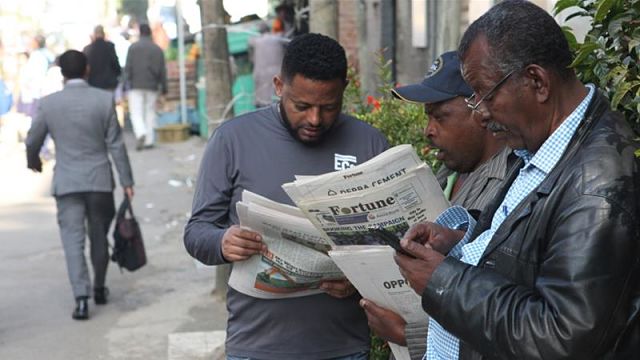 "The problem now is that so many individuals are mixing up the roles of activist and media when they shouldn't go together - media is meant to have its own ethics and rules," Abel Wabella, managing editor of the Addis Ababa-based newspaper Addis Zebye, said during an October 19 media forum in the capital to discuss the challenges faced by the media, and its role, in the country. "You have people running media who are calling for protests - it's totally absurd." (Al Jazeera)
"The problem now is that so many individuals are mixing up the roles of activist and media when they shouldn't go together - media is meant to have its own ethics and rules," Abel Wabella, managing editor of the Addis Ababa-based newspaper Addis Zebye, said during an October 19 media forum in the capital to discuss the challenges faced by the media, and its role, in the country. "You have people running media who are calling for protests - it's totally absurd." (Al Jazeera)
Al Jazeera
The challenges of navigating Ethiopia’s new media landscape
Addis Ababa, Ethiopia – In awarding the Nobel Peace Prize to Ethiopia’s Prime Minister Abiy Ahmed, the Nobel committee earlier this month praised his “discontinuing media censorship” among a series of achievements during his first 100 days in power in 2018.
These included the lifting of the country’s state of emergency, the release of thousands of political prisoners, the legalisation of outlawed opposition groups, the tackling of corruption and the promotion of women in politics.
The freeing of detained journalists and bloggers, along with an end to the blocking of more than 260 websites and the restoration of access to media outlets forced to work in exile, resulted in Ethiopia jumping 40 places in the 2019 World Press Freedom Index compiled by Reporters Without Borders – from 150 out of 180 countries to 110, the largest leap by any country.
But the outbreak in Ethiopia of violent protests last week – more than 60 are estimated killed in clashes across the Oromia region, and in the cities of Dire Dawa and Harar in eastern Ethiopia – is fuelling ongoing questions about whether such new media freedoms are being abused to stoke ethnic tensions.
—
Join the conversation on Twitter and Facebook.

























